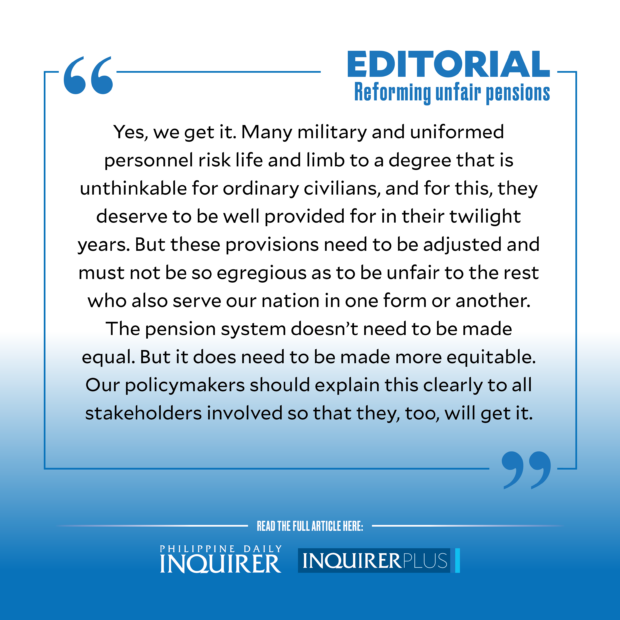Reforming unfair pensions
We get it.
Our soldiers, police personnel, and others who serve our country in the uniformed services deserve more than just the usual benefits accorded to government workers because of the risky nature of their profession.
That’s because most of them—though not all of them—routinely put life and limb on the line in the performance of their daily duties serving the nation.
For sure, a soldier conducting daily foot patrols searching for rebels in the mountains or rooting out terrorists in the jungles puts more on the line than a government employee in charge of processing documents behind a desk.
No doubt, both roles are important. But many workers classified under the “military and uniformed personnel” or MUP umbrella run a greater risk of not making it back to their families at the end of the day due to the nature of their work compared to mid-level bureaucrats who have to brave an arduous commute home after having their time cards punched at 5 p.m.
And because of this, military and uniformed personnel deserve the commensurate employment and post-employment benefits. But not to the extent of the yawning gap in pensions currently being enjoyed by both classes of public servants.
Simply put, the almost 200-percent difference between the average of P40,000 in monthly pensions that a retired MUP member enjoys over the P13,600 average monthly pension of a retired state worker is unfair. This becomes even more lopsided when one considers that the military and other uniformed personnel are not required to contribute part of their monthly wages while they are still employed to buttress their pension systems, while regular government workers have no choice in this matter with monthly salary deductions for the Government Service Insurance System being a normal fact of life for the latter.
We also get it: The current benefit structure was also put in place many years ago and built up successively over various presidential administrations, with the approval—nay, the orders—of chief executives eager to curry favor with generals and foot soldiers to ensure the stability of their governments and reduce the chances (especially in decades past) that restive military officers would perhaps take affairs of state into their own hands and stage coup d’états.But what does winning over the favor of the military and police cost the ordinary taxpayer who is paying for all this, all while struggling with ensuring that he is also looking after the needs of his family and the needs of his own future retirement on a meager monthly paycheck?For certain, the state should not renege on promises already made to existing military and uniformed personnel who are serving their country, knowing that their country will take care of them when the time comes.
But it must be made clear to everyone that this current structure—which threatens to bury the Philippine government under an even bigger mountain of debt that it already finds itself in at present—is unsustainable. With the total payouts expected to breach the P1 trillion mark by 2035 from P213 billion this year, Finance Secretary Benjamin Diokno warned of an imminent government fiscal collapse if no reforms are instituted.
A cutoff date must be decided upon by our policymakers beyond which all newcomers to the ranks of military and uniformed personnel services will have to pay their way toward enjoying retirement pensions, just as every other state worker does at present. No more free rides as far as pensions go. The new entrants’ pensions should then be rationalized to account for the size of their monthly contributions.
The other excessive provisions of the current system should also be corrected, including the automatic promotion to the next rank upon retirement of the military and uniformed personnel and the absence of a minimum pensionable age requirement.
Finally, to ensure that we maintain our military and uniformed personnel’s morale, the government should see to it that their other benefits are improved while they are still in active service. This means giving them better working conditions, raising their hazard and disability benefits, providing skills training that would benefit them if they decide to move to the private sector, as well as a host of benefits for them and their dependents, like health care.
Yes, we get it. Many military and uniformed personnel risk life and limb to a degree that is unthinkable for ordinary civilians, and for this, they deserve to be well provided for in their twilight years. But these provisions need to be adjusted and must not be so egregious as to be unfair to the rest who also serve our nation in one form or another.
The pension system doesn’t need to be made equal. But it does need to be made more equitable. Our policymakers should explain this clearly to all stakeholders involved so that they, too, will get it.





















